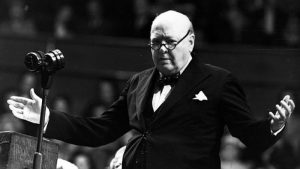
Finest Hour 162
Despatch Box

Winston Churchill, Parliament Square, London © Sue Lowry & Magellan PR
February 12, 2015
Finest Hour 162, Spring 2014
Page 4
WSC: THE BEST SPEECHES
I’ve always thought FH superb, but “Gadflies, Gods and Presidents” (FH 160:11) resonated strongly. With three young children, I do not get to as many events as I would like, even though I have been a member since arriving in Britain in 1999. But I have upgraded my support for the Churchill Centre UK and am especially pleased to have got to know Allen Packwood. I am now going to download from our website the list of speeches you recommend in your article.
JAMES AITKEN, LONDON
GASSED UP
“Leading Myths” on Churchill and Lethal Gas (FH 160:26) was very well done. It ought to drive a stake through the heart of this particular canard. But journalists being what they are, it probably won’t.
PROF. RAYMOND CALLAHAN, NEWARK, DEL.
CHURCHILL AND HOOVER
Many thanks for your good words and for taking notice of my Freedom Betrayed in Dantan Wernecke’s “Herbert Hoover’s Critique of Winston Churchill” (FH 160:19). I thought the writer was thoughtful, respectful, and raised appropriate points of comparison between Churchill and Hoover. I also much appreciated the very gracious reference to my editing.
PROF. GEORGE H. NASH, WEST BRANCH, IA.

2024 International Churchill Conference
I was surprised to read that former President Hoover had written of the Second World War, and believed Stalin more dangerous to Britain than Hitler. Hitler not Stalin made war on Britain; to have failed to choose sides against Hitler would have amounted to surrender. Hoover’s contention that the United States should not have gone to war against Hitler’s Germany similarly ignores that Germany declared war on the United States and did everything possible to annihilate Western civilization. However bad Communism was, Stalin didn’t attack the West. Stalin’s aggrandizement at the end of the Second World War was largely reversed by the outcome of the Cold War. Britain was right in aiding the USSR in its fight with their common enemy.
SHANIN SPECTER, PHILADELPHIA
Editor’s response: FH’s contention in the Hitler vs. Stalin debate has always been that Churchill chose the right enemy, since Stalin’s ambitions through 1939 did not extend beyond his borders. But there’s another side. As Anthony Montague Browne put it in his address to us in 1985: “it was only a few years previous that the Russians had concluded that hangman’s pact with Nazi Germany, closely followed by their cynical attack on Poland, and then on Finland and the Baltic States….Then there was the German U-boat base on Russian soil near Murmansk that didn’t get much publicity….The Soviet press gloated over every British defeat—and there were plenty to gloat over.”
Hoover’s concern was primarily the U.S., and he did support war on Germany in December 1941. Up to then he advocated all-out aid to Britain while arming the U.S. to the teeth. Had that been done, his supporters argue, the U.S. would have better withstood the Axis onslaught of 1942.
CHURCHILL AND WILSON
Justin Lyons’ “Winston Churchill’s Critique of Woodrow Wilson” (FH 160:12) is an excellent analysis of Wilson’s philosophy. One of Wilson’s Fourteen Points Churchill could not accept, which was not mentioned in Lyons’ article, was: “2. Absolute freedom of navigation upon the seas, outside territorial waters, alike in peace and in war, except as the seas may be closed in whole or in part by international action for the enforcement of international covenants.” Since Britain lives or dies by the sea, Churchill and others could accept no restrictions that limited Britain in the name of “freedom of navigation.”
DAVID DRUCKMAN, CHICAGO
Professor Lyons replies: Mr. Druckman is quite correct. See for example Churchill’s The Aftermath, Chapter VI “The Fourteen Points” (New York: Scribners, 1929), 103-09.
Subscribe
WANT MORE?
Get the Churchill Bulletin delivered to your inbox once a month.



